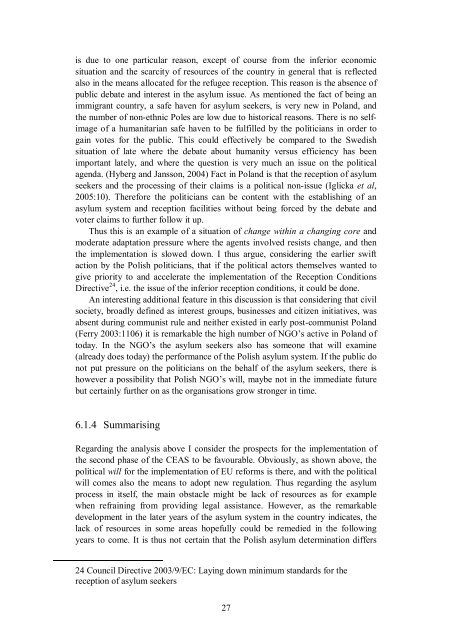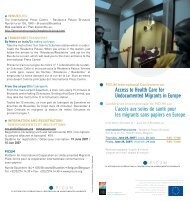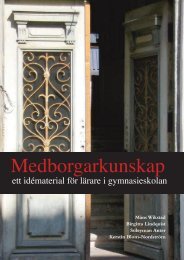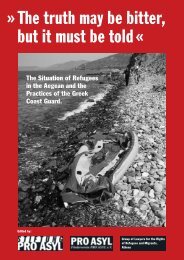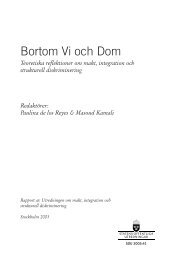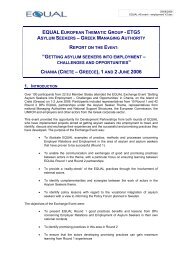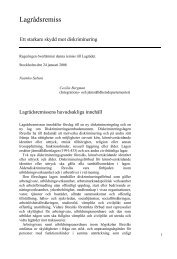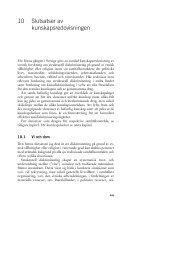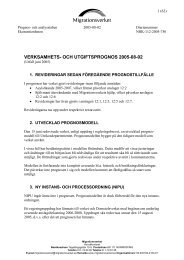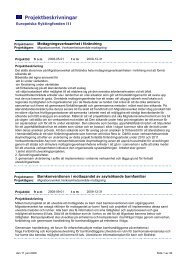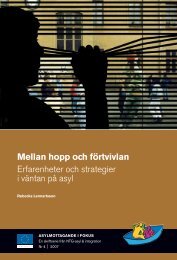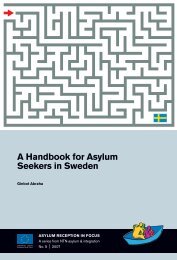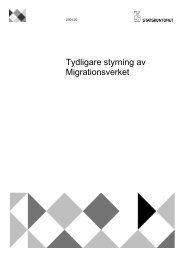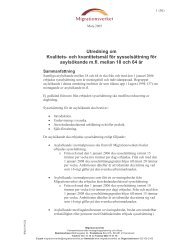The Common European Asylum System in Poland - Tema asyl ...
The Common European Asylum System in Poland - Tema asyl ...
The Common European Asylum System in Poland - Tema asyl ...
Create successful ePaper yourself
Turn your PDF publications into a flip-book with our unique Google optimized e-Paper software.
is due to one particular reason, except of course from the <strong>in</strong>ferior economic<br />
situation and the scarcity of resources of the country <strong>in</strong> general that is reflected<br />
also <strong>in</strong> the means allocated for the refugee reception. This reason is the absence of<br />
public debate and <strong>in</strong>terest <strong>in</strong> the <strong>asyl</strong>um issue. As mentioned the fact of be<strong>in</strong>g an<br />
immigrant country, a safe haven for <strong>asyl</strong>um seekers, is very new <strong>in</strong> <strong>Poland</strong>, and<br />
the number of non-ethnic Poles are low due to historical reasons. <strong>The</strong>re is no selfimage<br />
of a humanitarian safe haven to be fulfilled by the politicians <strong>in</strong> order to<br />
ga<strong>in</strong> votes for the public. This could effectively be compared to the Swedish<br />
situation of late where the debate about humanity versus efficiency has been<br />
important lately, and where the question is very much an issue on the political<br />
agenda. (Hyberg and Jansson, 2004) Fact <strong>in</strong> <strong>Poland</strong> is that the reception of <strong>asyl</strong>um<br />
seekers and the process<strong>in</strong>g of their claims is a political non-issue (Iglicka et al,<br />
2005:10). <strong>The</strong>refore the politicians can be content with the establish<strong>in</strong>g of an<br />
<strong>asyl</strong>um system and reception facilities without be<strong>in</strong>g forced by the debate and<br />
voter claims to further follow it up.<br />
Thus this is an example of a situation of change with<strong>in</strong> a chang<strong>in</strong>g core and<br />
moderate adaptation pressure where the agents <strong>in</strong>volved resists change, and then<br />
the implementation is slowed down. I thus argue, consider<strong>in</strong>g the earlier swift<br />
action by the Polish politicians, that if the political actors themselves wanted to<br />
give priority to and accelerate the implementation of the Reception Conditions<br />
Directive 24 , i.e. the issue of the <strong>in</strong>ferior reception conditions, it could be done.<br />
An <strong>in</strong>terest<strong>in</strong>g additional feature <strong>in</strong> this discussion is that consider<strong>in</strong>g that civil<br />
society, broadly def<strong>in</strong>ed as <strong>in</strong>terest groups, bus<strong>in</strong>esses and citizen <strong>in</strong>itiatives, was<br />
absent dur<strong>in</strong>g communist rule and neither existed <strong>in</strong> early post-communist <strong>Poland</strong><br />
(Ferry 2003:1106) it is remarkable the high number of NGO’s active <strong>in</strong> <strong>Poland</strong> of<br />
today. In the NGO’s the <strong>asyl</strong>um seekers also has someone that will exam<strong>in</strong>e<br />
(already does today) the performance of the Polish <strong>asyl</strong>um system. If the public do<br />
not put pressure on the politicians on the behalf of the <strong>asyl</strong>um seekers, there is<br />
however a possibility that Polish NGO’s will, maybe not <strong>in</strong> the immediate future<br />
but certa<strong>in</strong>ly further on as the organisations grow stronger <strong>in</strong> time.<br />
6.1.4 Summaris<strong>in</strong>g<br />
Regard<strong>in</strong>g the analysis above I consider the prospects for the implementation of<br />
the second phase of the CEAS to be favourable. Obviously, as shown above, the<br />
political will for the implementation of EU reforms is there, and with the political<br />
will comes also the means to adopt new regulation. Thus regard<strong>in</strong>g the <strong>asyl</strong>um<br />
process <strong>in</strong> itself, the ma<strong>in</strong> obstacle might be lack of resources as for example<br />
when refra<strong>in</strong><strong>in</strong>g from provid<strong>in</strong>g legal assistance. However, as the remarkable<br />
development <strong>in</strong> the later years of the <strong>asyl</strong>um system <strong>in</strong> the country <strong>in</strong>dicates, the<br />
lack of resources <strong>in</strong> some areas hopefully could be remedied <strong>in</strong> the follow<strong>in</strong>g<br />
years to come. It is thus not certa<strong>in</strong> that the Polish <strong>asyl</strong>um determ<strong>in</strong>ation differs<br />
24 Council Directive 2003/9/EC: Lay<strong>in</strong>g down m<strong>in</strong>imum standards for the<br />
reception of <strong>asyl</strong>um seekers<br />
27


